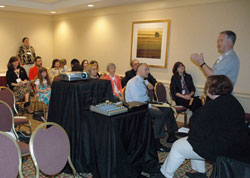Priest says Catholic bloggers ‘an extraordinary reality’ in Church life

Msgr. Paul Tighe, right, secretary for the Vatican’s Pontifical Council for Social Communications, discusses blogging during an impromptu meeting on June 23 at the Catholic Media Convention in Pittsburgh. Blogger Elizabeth Scalia, seated at right, also spoke during the meeting. (Photo by Sean Gallagher)
By Sean Gallagher
PITTSBURGH—Catholic bloggers are “an extraordinary reality in the life of the Church.”
Msgr. Paul Tighe, secretary for the Vatican’s Pontifical Council for Social Communications, made that observation during an impromptu meeting about blogging on June 23 during the Catholic Media Convention in Pittsburgh.
Catholic bloggers have a strong sense of community, Msgr. Tighe said, and Church leaders need to be aware of what is happening in the blogosphere because bloggers can “reach places that we’re not going to reach.
“We can provide them with the right kind of materials that they can work with,” he said. “They can give a reach out into broader communities. And that’s important.”
Msgr. Tighe was joined at the meeting by Elizabeth Scalia, managing editor of the Catholic portal at the religion website Patheos and a columnist for the ecumenical journal First Things. Scalia maintains her own frequently visited blog at www.patheos.com called “The Anchoress.”
Scalia was one of approximately 150 Catholic bloggers from several countries who participated in a May 2 meeting of bloggers at the Vatican.
She said that the meeting helped bloggers see that the Vatican takes them seriously, wants to work with them and “understands the fact that we are largely autonomous people not looking to be controlled.
“The bloggers came away very happy,” Scalia said. “And I think the Church came away pretty happy, too, because the bloggers, for the most part, said that we like you. We want to be clear on your behalf. We want to help out.”
Both Scalia and Msgr. Tighe suggested that the next step to follow the bloggers’ meeting at the Vatican would be for groups of bishops or individual bishops to meet with bloggers. (Related: Who’s into blogging? Plenty of bishops)
This was important for Scalia because blogs, their comment boxes, also known as “comboxes,” and “alternative media” in general are where a growing number of the faithful are exploring their faith.
“This is where they’re expressing confusion or fear or disgust,” she said. “This is where they’re saying, ‘Is there going to be a Church in 20 years for my kids? How do I pass this on to them?’ This is where they’re daring to wonder.
“I think it’s really important for our shepherds to say, ‘If this is where the sheep are feeding, I had better get to know that turf. I had better get to see what they’re feeding on. I want to see where in that field they’re moving a little too close to the walls.’ ”
Scalia recommended that all bishops have someone to monitor blogs and other social media, and to have a blog themselves.
But while it is important for bishops to pay attention to bloggers, Scalia also noted that Catholic bloggers have a need for their bishops.
“We’re the sheep, too,” she said. “And we need the support of the bishops ... through their encouragement, their correction from time to time.
“That doesn’t mean that we want to be put under obedience. We clearly don’t. But, at the same time, we are absolutely in need of the shepherd’s guidance and the shepherd’s support.”
Attending the June 23 meeting was Deacon Greg Kandra, a deacon of the Diocese of Brooklyn, N.Y., who maintains a prominent blog named “The Deacon’s Bench.” He also is now executive editor of ONE magazine, published by the Catholic Near East Welfare Association.
He said that members of the clergy who blog have a duty to be “vigilant about making sure that the Church’s teachings are fairly represented.
“One of the big subjects of the day right now is about homosexuality and same-sex marriage,” said Deacon Kandra. “I get this a lot from people that the Church hates gay people. And I have to intervene periodically and say that’s not actually the case. There is a lot of clarification that has to go on.”
Even though he acknowledged that Catholic bloggers often debate issues quite vigorously, Msgr. Tighe said the May 2 Vatican event confirmed for him that there is a vibrant community among them.
“I felt that we were gate-crashing a party because there were all these people who knew each other and were delighted to meet each other,” Msgr. Tighe said. “We provided the venue for that. That was great. It wasn’t our party, but it was great.” †
